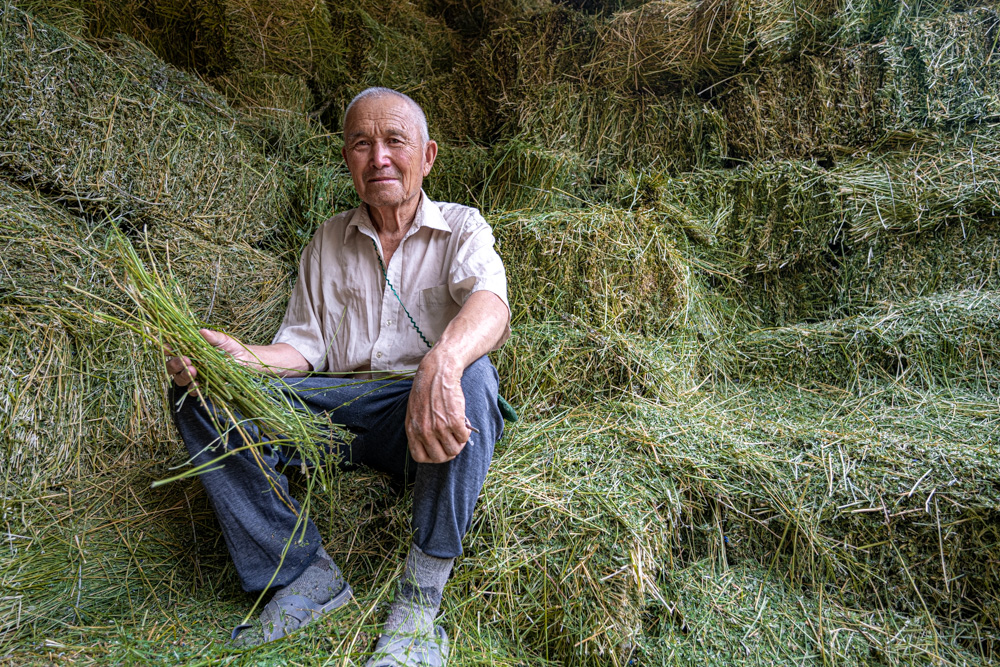
Drought-Resilient Alfalfa Offers Lifeline to Kazakh Farmers
October 15, 2025| |
A new, climate-resilient variety of alfalfa has been released in Kazakhstan, offering hope to farmers fighting severe drought and water scarcity. The variety, named Tozimdi (meaning "stable" or "sustainable" in Kazakh), was developed through an international collaboration between the Kazakhstan Scientific Research Institute for Agriculture and Plant Growing (KSRIAPG) and the Australian Pastures Genebank at the South Australian Research and Development Institute (SARDI).
The success of Tozimdi comes from tapping into wild alfalfa relatives stored in global genebanks. Breeders cross-bred local alfalfa with these wild species, which are naturally endowed with exceptional traits such as drought- and heat-tolerance, able to withstand temperatures from -20 to 40 degrees Celsius (4 to 104 degrees Fahrenheit). This work was funded by the BOLD (Biodiversity for Opportunities, Livelihoods, and Development) project, led by the Crop Trust. The new variety is expected to provide stable forage in drylands, help slow desertification, and improve soil health due to alfalfa's natural nitrogen-fixing properties.
For Kazakh farmers, the economic benefits are immediate and substantial. Tozimdi is a high-yielding variety that can provide three to four harvests per year. Farmers who tested the plant across various regions were impressed with its resilience, yield potential, and ability to thrive during the cooler, wetter periods, while also enduring the hot, dry summers. This climate-smart approach to agriculture—drawing on genetic diversity to enhance crop resilience—is being celebrated as a vital step toward safeguarding Kazakhstan's food security and boosting the profitability of its livestock sector.
For more details, read the article on The Crop Trust website.
| |
You might also like:
- Scientists Use CRISPR to Identify Gene Linked to Waterlogging Resilience in Alfalfa
- US FDA Completes Review of Altered Lignin Alfalfa Developed by Cibus and S&W Seed
- ARS Research Team Boost Alfalfa's Salt Tolerance
Biotech Updates is a weekly newsletter of ISAAA, a not-for-profit organization. It is distributed for free to over 22,000 subscribers worldwide to inform them about the key developments in biosciences, especially in biotechnology. Your support will help us in our mission to feed the world with knowledge. You can help by donating as little as $10.
-
See more articles:
-
Plant
- New Gene Editing Technique Boosts Precision and Efficiency
- Heidelberg University Researchers Discover Plant's Drought-Survival Mechanism
- Drought-Resilient Alfalfa Offers Lifeline to Kazakh Farmers
- Scientists Discover Pair of Genes that Strengthens Wheat’s Defense Against Powdery Mildew
- Philippine Educators Convene to Help Develop Biotech Learning Materials
- Australia Approves Commercial Planting of GM Cotton
- Study Examines Impact of U.S. GM Crop Imports on Indonesia’s Food Self-Sufficiency
- Media Practitioners and Biotech Experts Discuss Biotech Updates in the Philippines
-
Read the latest: - Biotech Updates (February 18, 2026)
- Gene Editing Supplement (January 28, 2026)
- Gene Drive Supplement (February 22, 2023)
-
Subscribe to BU: - Share
- Tweet

